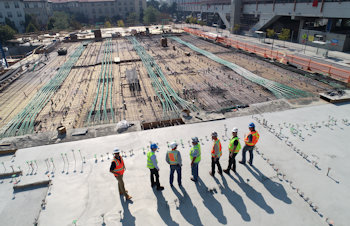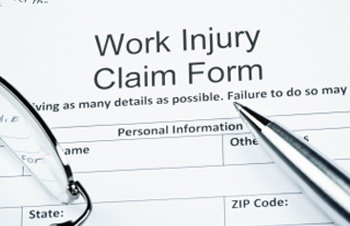Our Work Injury Attorneys Answer Your Questions
Q. What is workers' compensation?
A. Workers' compensation is a system of benefits provided by Illinois law to most workers who have been injured while at work. The amount of benefits is subject to limits set forth by the law.
Q. Who is covered?
A. Almost every employee who is injured and whose employment is localized in the State of Illinois is covered by the Illinois Workers' Compensation Act. Coverage begins the moment the employee begins working.
Q. Who provides the benefits?
A. The employer is responsible for providing benefits. The employer may be self-insured or have contracted with an insurance company to provide workers' compensation insurance for their employees.
Q. Who administers the law?
A. The Illinois Workers’ Compensation Commission is responsible for administering the law. It is responsible for resolving disputes regarding employees' entitlement to benefits and the amount of benefits.
Q. Can an employee be fired because he or she has filed a workers' compensation claim?
A. It is against the law for an employer to fire an employee because he or she filed a workers' compensation claim. Such conduct by an employer may give rise to a right to file a separate claim for damages in Circuit Court. The Illinois Workers’ Compensation Commission does not have jurisdiction over such a claim.
Q. Are workers' compensation benefits subject to income tax?
A. No. Workers' compensation benefits are not subject to state or federal income tax and need not be reported on tax returns as income.
Q. Who should the injured employee notify of his or her accident?
A. The employee must inform the employer of a work injury immediately. Our attorneys stress that a delay in notification may result in a delay of benefits. A delay of more than 45 days may result in the complete denial of the entire claim. Notice to a non-management co-worker is not considered notice to the employer.
Q. What should the notice include?
A. The law requires that the employee notify the employer of the date and place of the accident.
Q. What is the best form of notice?
A. The best form of notice is a written and dated notification of the accident to the employer. A copy of the notification should be retained by the employee for his or her records.
Q. What should the injured worker do after notice is given?
A. The injured worker should seek immediate medical attention if he or she has not done so already. The injured worker should also keep the employer informed of their medical status: i.e. whether they are under doctor's care, and/or whether the doctor is restricting them from work.
Q. Is there any other notification that should be given to the employer?
A. If the injured worker's doctor is restricting the employee from work, such information should be put in writing by the doctor and given to the employer and/or their insurance carrier.
Q. Can the employee choose his or her own treating doctor or hospital?
A. Yes, an employee may choose his or her own treating doctor or hospital when claiming workers' compensation medical benefits. However, if the employer has an existing plan, the employee may be required to obtain treatment from a doctor or hospital selected by the employer.
Q. Is the employer required to pay all the medical bills?
A. If the treatment provided is reasonable and necessary to cure or relieve the employee from the effects of the work injury, and the provider of the medical services has given the employer the information required by law, the employer is required to pay the reasonable charges.
Q. Is the employer entitled to their own medical evaluation of the injured employee?
A. Yes. If an employee claims to be entitled to workers' compensation medical benefits, the employer can request that the injured employee submit to a medical examination by a doctor of the employer's choosing. This is called an Independent Medical Examination (IME).
The employer is required to pay for the mileage incurred by the injured employee while attending the IME.
Notably, an employee's refusal to submit to an Independent Medical Examination can result in the loss of benefits.
Q. What are Temporary Total Disability (TTD) Benefits?
A. Temporary Total Disability benefits are paid to the injured employee who was/is unable to work while recovering from a work-related injury. It is necessary for the injured worker to provide medical documentation, substantiating his or her inability to work.
Q. When do TTD benefits begin?
A. TTD benefits are not paid for the first three work days lost after an injury, unless the disability continues for 14 or more calendar days.
Q. How is the amount of TTD determined?
A. The benefit is two-thirds (66 2/3%) of the employee's gross average weekly wage, subject to certain limits. The average is based on the employee's wages during the 52-week period immediately preceding the injury. The rate is fixed at the time of the injury, and does not change with any fluctuation in the employee's salary.
Q. What are Permanent Partial Disability (PPD) benefits?
A. Permanent Partial Disability benefits are paid only if the job-related injury results in the permanent loss or loss of use of a part of the body or the whole body. PPD benefits will be paid only after the employee's condition has reached maximum medical improvement (MMI).
Q. What is the time frame in which an employee must file a claim at the Industrial Commission?
A. Workers' compensation claims must be filed within a time period designated by the Illinois Workers’ Compensation Act. Failure to file a claim within the time provided by the law generally results in a loss of benefits.
Q. Who presides over workers' compensation claims?
A. An arbitrator appointed by the Governor acts as fact-finder and judge, conductor of the hearing, and decider of the amount of benefits to which an employee is entitled.
Q. Is it possible to appeal the arbitrator's decision?
A. Yes. The employee and employer both have the right to appeal a decision. In most cases, a panel of three Commissioners will review the Arbitrator's decision. Either party can then appeal the Commission's decision to the Circuit Court and, from there, to the Industrial Commission Division of the Appellate Court. In some cases, further appeal may be taken to the Illinois Supreme Court.
Q. Can the parties settle a claim for compensation benefits?
A. Yes. Claims may be settled between the parties, provided the settlements are approved by the Illinois Workers' Compensation Commission. All settlements must have The Commission's approval.
*** This information is intended to serve only as a general overview of the rights of employees who have had work-related injuries. This information provides a brief overview of the rights of injured employees as set forth under the Illinois Workers' Compensation Act. This information does not constitute legal advice and does not represent all the rights as set forth under the Illinois Workers' Compensation Act.
It is not intended to explain all the benefits or conditions pertaining to specific cases. Each individual case has to be evaluated by applying the law to the facts of each case.
Portions of this information were excerpted from the Illinois Industrial Commission Handbook on Workers' Compensation.
 General Overview
General Overview Notifying the Employer
Notifying the Employer Evaluation & Treatment
Evaluation & Treatment Compensation Benefits
Compensation Benefits Claims Overview
Claims Overview